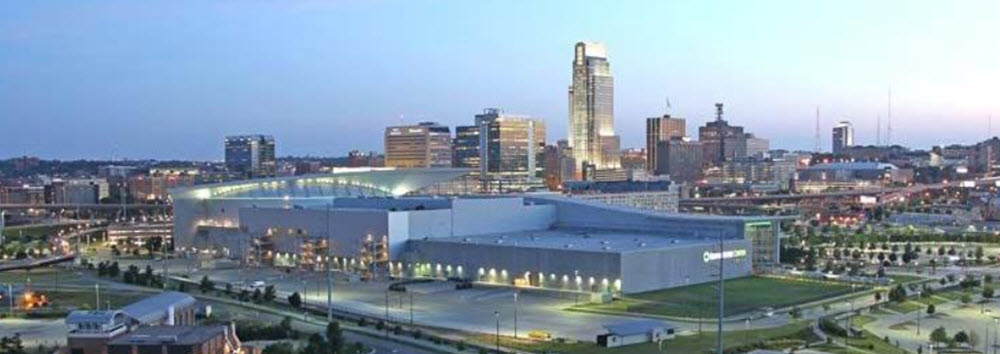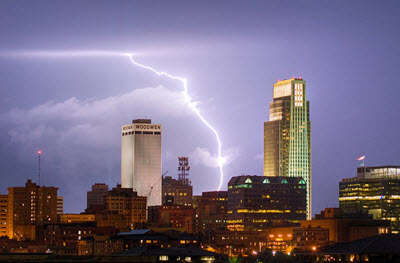Located in the Midwestern United States, Omaha is the largest city in the state of Nebraska. The city proper is home to roughly 465,000 people (2017), while nearly 900,000 live in the Omaha metropolitan area.
Just like many other cities in the Western United States, Omaha was developed on a grid plan. The city’s center is where Dodge Street crosses the Missouri River. During the 19th century, this was the location of a ferry crossing, and the city grew around it, giving Omaha the nickname “Gateway to the West” since so many migrants crossed the river here on their way to the Western United States. The geography of Omaha is characterized by its riverfront position, with East Omaha sitting on the flood plain west of the river.
Businessmen and tourists visiting Omaha can choose from a number of good hotels. One of the best is the Ameristar Hotel. It is a high-end hotel with good amenities.

Economy
The economy of Omaha is diversified and includes sectors such as banking, insurance, construction, telecommunications, and transportation. In the early 2000s, the city emerged as one of the top 10 cities for high-tech companies in the United States. The economy here has grown dramatically since the 1990s, and Omaha is home to numerous company headquarters for large corporations. One of Omaha’s most prominent businesses men, Warren Buffett, was born here in 1930.
Examples of large employers in the Omaha area
| Offutt Air Force Base |
| CHI Health |
| Omaha Public Schools |
| Methodist Health System |
| Nebraska Medical Center |
| University of Nebraska Medical Center |
| First Data |
| Union Pacific |
| Hy-Vee |
| First National of Nebraska |
Four Fortune 500 companies are headquartered in Omaha:
- The mega-conglomerate Berkshire Hathaway, chaired and CEO:ed by Warren Buffet. This a publicly traded company listed at the New York Stock Exchange.
- The privately held, employee-owned Kiewit Corporation, one of the largest construction companies in the world.
- The privately held Mutual of Omaha, a multi-line organization providing insurance, banking, and financial products for individuals, businesses, and groups.
- The Union Pacific Corporation (NYSE: UNP), the largest railroad operator in the United States.
Also headquartered in Omaha is the First National Bank of Omaha, the largest privately held bank in the United States.
Several companies with their headquarters in Omaha are very popular in the retail investor market. A lot of small investors choose to invest some of their savings in Berkshire Hathaway and Union Pacific Corporation. These two companies are also popular among binary options traders. The binary options brokers IQ Option and Nadex are two examples of brokers who offer binary options based on these companies.
There are also several different companies that offer CFD:s based on popular Omaha stocks such as Berkshire Hathaway, CFD:s are illegal in the US but are popular outside the united states, and many traders enjoy trading CFD:s based on US stocks such as Berkshire Hathaway. You can visit daytrading.com to compare CFD Brokers.
Weather
 The climate is humid continental, and the absence of large bodies of water that would have a tempering effect tends to make the contrast between the summers and winters sharp. The temperature records for Omaha are 114 °F (46 °C) and −32 °F (−36 °C), respectively. In an average winter, Omaha gets less than 27 inches (70 cm) of snowfall.
The climate is humid continental, and the absence of large bodies of water that would have a tempering effect tends to make the contrast between the summers and winters sharp. The temperature records for Omaha are 114 °F (46 °C) and −32 °F (−36 °C), respectively. In an average winter, Omaha gets less than 27 inches (70 cm) of snowfall.
During the summer season, thunderstorms are common, and they are capable of spawning tornadoes. One of the most destructive tornadoes in the history of Omaha formed on Easter Sunday 1913, destroying significant parts of Midtown and North Omaha, and causing over 200 fatalities.
Since its creation, Omaha has gone through several instances of serious flooding. The Carter Lake was for instance created by flooding in 1877 that was so massive that it altered the course of the Missouri River, turning a river bend into an oxbow lake. In the spring of 1881, Omaha and Council Bluffs were flooded for almost a month, causing millions of dollars worth of damage. Two other notable floods occurred in 1943 and 1952, respectively. The flood of 1952 forced the evacuation of an estimated 40,000 people from East Omaha and the Carter Lake area, and U.S. President Harry S. Truman declared it a disaster area.
Background
Various Native American peoples have lived in the place that is now the Omaha area, including the Omaha people for which the city is named. The Omaha (Umoⁿhoⁿ / Umaⁿhaⁿ) tribe migrated from the Ohio River Valley to the upper Missouri area and the Plains in the late 1600s. The name means “Dwellers of the steep bank”.
In the early 1800s, immigrants of European ancestry built fur trading outposts in the area south of today’s Omaha. In 1846, migrating Mormons set up a temporary settlement called Cutler’s Park at what is now the intersection of Mormon Bridge Road and Young Street in Omaha. Mormons also created Winter Quarters roughly 3.5 miles west-southwest of this point.
In 1854, the Omaha Tribe ceded most of east-central Nebraska. That same year, residents from Council Bluffs began staking claims, and on July 4, the city was informally established during a picnic held on Capitol Hill, current side om Omaha Central High School.
1854 was also the year when the Virginia-born lawyer James C. Mitchell purchased land and founded the town Florence, which was incorporated two years later. Today, the Bank of Florence is recognized as the oldest building in Omaha. Florence was annexed by Omaha in 1917 and is now a part of North Omaha.
Omaha was the capital of the Nebraska Territory, but when Nebraska became a state in 1867 Lincoln was named capital instead.
